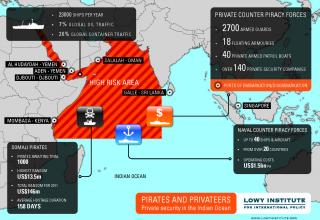
September 2012
Although the international community is seeing the first reduction in piracy in the Indian Ocean since a global response in 2008, maritime authorities are warning merchants that the international naval operations won’t be able to go on forever.
Indeed, their conclusion may be sooner rather than later. As defense budgets get cut world-wide, shipping companies may have to rely on private security to defend their cargo and crew from these sea devils. Fortunately, this boom in industry is already in swing, and has actually contributed significantly to the reduction in attacks.
As no armed vessel has yet to be hijacked by pirates, many wonder who is really behind the drop in piracy. While international navies provide an intimidating force to be reckoned with, their high-cost and generally large strategic footprint make them a cumbersome solution to a problem.
While these military operations take the approach of squashing a fly with a sledge-hammer, private security firms offer a more subtle yet effective solution to the problem.
Of course, this rise is not without complications. There remain significant questions regarding jurisdiction and the rules of engagement in international waters. There have already been international incidents, and the judgment of some private security guards has been called into question.
A recent report, released by the Lowy Institute for International Policy highlights the growth and future outlook for the private maritime security industry.
The report throws together some impressive numbers regarding this burgeoning industry. Over 140 companies now operate providing armed protection for merchant vessels in the Indian Ocean. These companies employ 2,700 contractors and have 18 floating armories to augment success.
These floating armories provide facilities for contractors to arm themselves, and most importantly, de-arm themselves when they travel into ports that ban weapons aboard ships that make call.
In addition, 40 armed patrol boats are making rounds in the vital shipping lanes that cross the Indian Ocean. While many are small and capable of swift and potentially stealthy counter-pirate tactices, there are three very large vessels employing squads of private contractors, heavy weapons and even unmanned aerial vehicles. The international Maritime Organization has condemned such vessels, for fear of their aggressive use causing international incidents.
As this industry gets off its feet, even national governments are following suit. Many governments hire out members of their own military to provide armed security for ships flying their flag. While these vessel protection detachments are certainly more efficient than dispatching an entire military vessel to the region, there is a huge risk: Should these soldiers improperly conduct themselves or engage vessels innocent of piracy, they are acting as official representations of a sovereign nation, which could — in extreme circumstances — constitute an act of war. For this reason, generally unaffiliated private contractors are better suited for these duties.